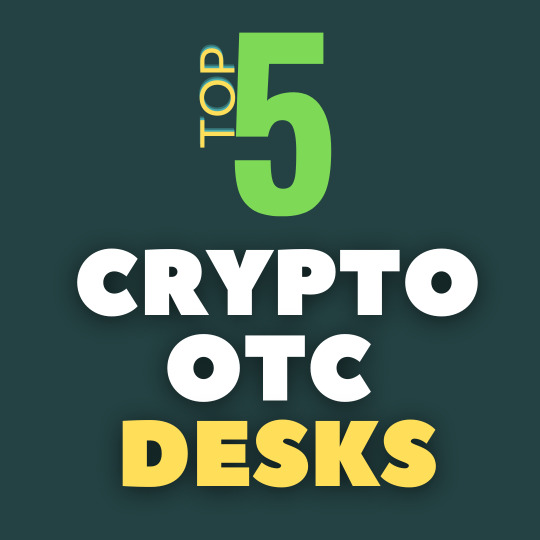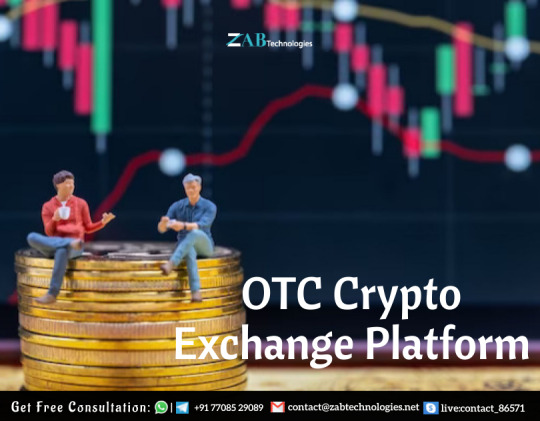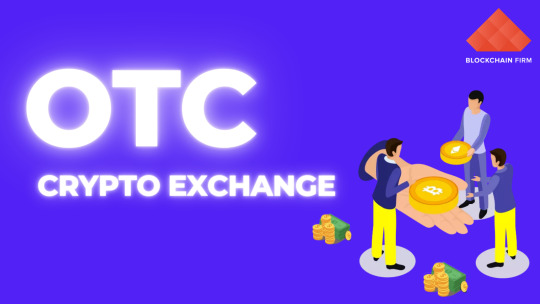#OTC Exchange
Text

How OTC Crypto Trading Works
Most OTC desks mandate approval for trading and enforce trade minimums typically starting in the five or six-figure range. They assign individual account representatives to clients, offering options such as buying, selling, lending, borrowing, and custody services.
While some OTC desks connect buyers and sellers on a case-by-case basis, larger platforms often maintain a ready pool of liquidity for instant trades, akin to regular crypto exchanges.
OTC desks usually generate revenue by charging a spread or commission on trades, with spreads ranging from 0.25% to about 1% of the transaction size.
0 notes
Text
SYNCHRO
Crypto Options OTC Trading Platform
SynOption operates SYNCHRO, a Crypto Options analytics and trading platform. Synchro allows for trading of Crypto Options in OTC and Exchange based formats, providing liquidity across exchanges, product suites, and alt-coins. Our unique features of Crypto Options make us unique in the market.
2 notes
·
View notes
Text
Managing The Risk And Trading Crypto Currencies Responsibly
Let’s talk about some of the best risk management strategies which may prove beneficial for crypto traders. We can assist you with all the perfect risk management strategies which you can apply while trading on our OTC platform. For more information, just get in touch with us so that we can serve you better and in the best possible way.
#buy and sell crypto in Dubai#Crypto exchange in Dubai#OTC crypto trading in Dubai#Trading Crypto Currencies
2 notes
·
View notes
Text
#otc crypto exchange development#otc crypto exchange#otc crypto trading platform development#otc crypto trading platform
0 notes
Text

OTC Crypto Exchange Platform
An OTC crypto exchange is a platform where buyers and sellers can trade cryptocurrencies directly without intermediates. It is ideal for large trades or high-net-worth individuals who want to avoid the price fluctuations and limits imposed by other exchanges. It offers higher liquidity and greater privacy than regular crypto exchanges. If you are interested to know everything about OTC Crypto Exchange Development, then check here, https://bit.ly/3FHqQZ4
0 notes
Text
Start your Crypto Exchange with the Coinbase clone script
Coinbase is one of the popular exchanges in the crypto exchange market. It is an OTC-based crypto exchange with a user-friendly dashboard. Coinbase clone script is an instant solution for cryptopreneurs. It is pre-developed, pre-tested, and ready-made software, that is loaded with all essential and existing features of coinbase. Check out the link to the complete guide about the coinbase clone script.
0 notes
Photo

Are you searching for an OTC exchange development company? || Blockchain Firm helps you build a reliable and highly customizable exchange software with advanced features. Share your requirements for crypto exchange development by clicking the link: https://www.blockchainfirm.io/blockchain-exchange-development-company
0 notes
Text
Popular Platforms for USDT to INR Exchange
If you're looking to convert INR to USDT, several platforms specifically cater to Indian traders, offering specialized services, competitive rates, and compliance with local regulations.
A2ZCrypto OTC: A2ZCrypto is a top OTC platform known for its smooth INR to USDT trading, competitive pricing, and exceptional customer support tailored for Indian users. For large conversions, ensure your KYC documentation is ready, including PAN, Aadhaar Card, the last six months’ bank statements, and two years’ ITR files. Note: A 1% TDS will be deducted and submitted against your PAN, along with a 0.2% platform fee.
WazirX OTC: WazirX offers an OTC desk with a minimum trade size of ₹100,000, providing personalized support and services for Indian clients.
Coindcx OTC: Coindcx enables INR to USDT trading with a minimum trade size of ₹50,000, offering competitive rates and dedicated support for Indian customers.
#convert INR to USDT#Best Crypto OTC Trading Platform#USDT to INR exchange#A2ZCrypto OTC#leading OTC platform#WazirX OTC#Coindcx OTC
0 notes
Text
Can the FTX Token (FTT) make money from cryptocurrency exchanges?
Can the FTX Token (FTT) make money from cryptocurrency exchanges?
FTX (FTT) is struggling for survival after Binance (BNB) dropped an acquisition bid.
For example, FTX chief executive Sam Bankman-Fried is struggling to raise money to keep FTX afloat, The Wall Street Journal speculates. FTX could collapse without a buyer, The Washington Post speculates.
Binance CEO Changpeng Zhao backed out of the FTX deal because “mishandled customer funds” and media…

View On WordPress
#Can the FTX Token (FTT) make money from cryptocurrency exchanges?#Crypto-as-a-Service (CAAS)#FTX offers OTC-Trading and Derivatives#FTX US#The FTX Token (FTT)#What is FTX?#What Value does the FTX Token (FTT) have?
0 notes
Text
youtube
#crypto market#fintech#finance#software#singapore#SynOption operates SYNCHRO#a Crypto Options Analytics and Trading Platform. Our dynamic OTC platform allows for trading of Crypto options in OTC and Exchange based fo#providing liquidity across exchanges#product suites#and alt-coins.#Key Features of Synchro - Crypto Options Analytics and Trading Platform#1. Multi Leg Strategies#2. Delta Cost Savings#3. Institutional Liquidity#4. RFQ Based Workflows#5. Multiple Clearing Venues#Youtube
2 notes
·
View notes
Text
Wednesday Workday - A Buffet of Hot OTC's Dress Socks

Auro's Get Chuckie going in the Morning, Long, Black, Nylon, Ribbed, That Hot Gold Ring Around his Tasty Toes, I have to admit they get me going most afternoons. The Look, The Taste, the Smell. Yeah this day we rented a room for a Little Nooner. Lots of fun and in the end we exchanged Socks. Another Hot one for my collection!
36 notes
·
View notes
Text

The popularity of OTC crypto trading has been growing enormously. And many businesses have developed this crypto exchange and made a lot of profit through this. It is nothing but a platform where buyers and sellers can bulk trade cryptocurrencies directly with help of admin. It provides several advantages such as liquidity, faster transactions, and lower fees. know more @ https://bit.ly/3FHqQZ4
#OTC Crypto exchange#OTC trading software#OTC Trading desk#Cryptocurrency Exchange#develop OTC crypto Exchange
0 notes
Text
Mutual aid request
Hey folks, I know I don't post much personal stuff on here these days, but we've been in dire straits lately and we could really use some help! My fiance's brother moved out of the house a few months back and we've been struggling to make end's meet and cover the bills without his portion of rent ever since. I lost my WFH job and my insurance a month before he left, and I've recently started getting a crushing tooth pain that I can barely sleep or focus with that max strength OTC pain meds aren't even touching. I really hate to e-beg, but times are getting tough and I we could use some relief.
Ordinarily I'd offer art in exchange for money, but I am hardly in any shape to work with the pain I'm in and I've sworn off of taking more emergency commissions until I've finished the queue that I still owe people. If anyone would like to help by making a donation to my Ko-fi so I can at least be seen by a dentist before this molar goes any more critical, the URL is https://ko-fi.com/doggymove.
I appreciate any amount that folks can send my way, even if it's just a few dollars. All I need is enough to cover a down payment on a payment plan, after that I can take it from there.
16 notes
·
View notes
Text
It’s a cartel in the classic economic and business sense—OPEC, not Sinaloa—a small group of connected actors working together to dominate a market that they only recently helped create. For crypto, where money is fake, value is purely hype-based, and new tokens can be spun out of nothing, it makes perfect sense. It’s a small industry, notionally worth $3 trillion at its peak in November 2021 but now hovering around $1 trillion. Many leading crypto luminaries know each other, interact on social media, trade with each other, and hobnob at small private gatherings like the Satoshi Roundtable, an annual invite-only meeting of select crypto insiders. Last spring, I confirmed via some attendees that Jean-Louis van der Velde, Tether’s elusive Hong Kong-based CEO, was at the invite-only FTX conference in the Bahamas, alongside luminaries like Bill Clinton and Tony Blair. In a public Twitter exchange, Bankman-Fried—whose Alameda hedge fund allegedly bought at least $36 billion worth of Tether in just a few years—said he didn’t know if van der Velde was there. I didn’t believe him.
Many crypto power players have histories with poker, online gambling, offshore finance, and/or other gray-market economies. A lot of them do business via so-called OTC, or over the counter, trades: person-to-person exchanges that might not leave a trace on the blockchain, crypto’s supposedly transparent public ledger. Over time, the industry, including its black-market participants, has developed its own protocols, social codes, and, as interests aligned, what amounted to an omerta. What was good for one member was often good for the rest.
40 notes
·
View notes
Text

Derivatives: Unraveling the Complex World of Financial Instruments.
Introduction:
Derivatives, often described as the "financial weapons of mass destruction" by Warren Buffett, play a pivotal role in modern financial markets. These instruments derive their value from an underlying asset, index, or interest rate. In this revamped blog, we'll explore the different types of derivatives, their uses, and the impact they've had on global finance.
Types of Derivatives:
1. Options:
Options provide investors with the right (but not the obligation) to buy or sell an asset at a predetermined price (the strike price) within a specified time frame. Key points about options:
•Call Options: These allow the holder to buy the underlying asset.
•Put Options: These allow the holder to sell the underlying asset.
•Options are used for speculation, hedging, and income generation.
2. Futures:
Futures contracts are standardized agreements to buy or sell an asset at a predetermined price on a specific future date. Here's what you need to know:
•Exchange-Traded: Futures are traded on organized exchanges, ensuring liquidity and transparency.
•Risk Management: Hedgers use futures to protect against price fluctuations (e.g., farmers hedging crop prices).
•Leverage: Futures allow substantial exposure with a smaller upfront investment.
3. Forwards:
Forwards are similar to futures but are customized contracts negotiated directly between parties. Key features:
•Flexibility: Forwards can be tailored to specific needs (e.g., unique delivery dates or quantities).
•Private Agreements: Unlike futures, forwards are over-the-counter (OTC) and lack standardization.
•Credit Risk: Counterparty risk exists, as there's no central clearinghouse.
4. Swaps:
Swaps involve exchanging cash flows based on predetermined terms. Common types include:
•Interest Rate Swaps: Parties exchange fixed and floating interest payments.
•Currency Swaps: Useful for managing foreign exchange risk.
•Credit Default Swaps: Used to hedge credit risk.
Market Impact and Regulation:
The derivatives market has grown exponentially, but it's not without risks:
•Systemic Risk: The 2008 financial crisis highlighted the interconnectedness of derivatives and their potential to destabilize markets.
•Regulatory Reforms: Authorities like SEBI (Securities and Exchange Board of India) have tightened regulations to enhance transparency and mitigate risks.
Conclusion:
Derivatives are powerful tools, but their complexity demands caution. Whether you're a trader, investor, or risk manager, understanding derivatives is essential. As we navigate this intricate landscape, let's remember that with great power comes great responsibility.
2 notes
·
View notes
